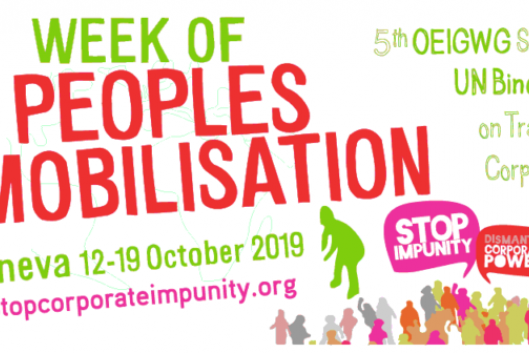(Disponible uniquement en anglais et espagnol)
14 October 2019, Geneva:
The United Nations (UN) Inter-governmental Working Group (IGWG) discussing a treaty on “transnational corporations and other business enterprises with respect to human rights,”(1) enters its fifth round of negotiations this week from 14-18 October at the UN Human Rights Council. During this session, UN member states will negotiate the second draft of this ground-breaking treaty that aims to hold transnational corporations to account for their human rights violations.
Interest in this process continues to grows as evidenced in the significant presence of UN member states delegates, civil society and elected officials worldwide. 321 members of regional and national parliaments, as well as municipal authorities have endorsed the Call of People’s Representatives Worldwide for the UN Binding Treaty (2)
Charles Santiago, Member of the Parliament of Malaysia stated, “Prices of medicines are very high and people are dying because of that. This is a consequence of the monopolies controlled by Transnational Corporations (TNCs). The emerging movement tackling TNCs´ power pushing for UN Binding regulations on TNCs is encouraging for all of us.”
Delegates from over 40 countries representing communities affected by transnational corporations’ human rights violations, social movements, trade unions and civil society organisations are in Geneva this week to present their proposals.
Tchenna Maso from La Via Campesina / Movement of affected by Dams in Brasil, said, ”We are concerned about the content of the revised draft text presented for discussion this week because it does not reflect many of our key concerns and proposals. In particular, the treaty needs a primary focus on transnational corporations, as indicated in the original resolution 26/9, to address the corporate impunity we see in the world.” (3)
Kea Seipato. Coordinator of the Southern African section of the Global Campaign to Reclaim Peoples Sovereignty, Dismantle Corporate Power and Stop Impunity (3), stressed that, “The people of Southern Africa are calling for a self-determined development and are demanding a Treaty that will ensure that. They are calling for the ‘Right to Say No’ to the plunder of their resources by transnational corporations.”
Pablo Fajardo, representative of the Union of People Affected by Chevron in Ecuador (4), said, ” International financial systems and multinationals have captured the Ecuadorian State over the last two years. That is why a binding treaty is needed, which returns sovereignty to peoples and states. But it is also clear to us that a UN binding treaty that is not accompanied by sustained social action will not be effective. As exemplified by recent events in Ecuador over the past ten days.“
Karin Nansen, chair of Friends of the Earth International (6) said: “Environmental and human rights defenders are on the frontline of resisting the violations committed by transnational corporations, enduring systematic attacks of intimidation, silencing and killings. The historical importance of this binding treaty process to end, once and for all, the impunity of transnational corporations and guarantee access to justice for those affected cannot be overemphasized.”
Today international activists performed in front of the Palais de Nations representing how transnational corporations use Investor-State Dispute Settlement mechanisms (ISDS) to sue states that implement regulations to protect labour standards or the environment. The action is part of a tour traveling from Geneva to Vienna, where today the UN Trade Commission UNCITRAL begin negotiations on a reform of the ISDS system. (7)(8)
Dr. Thomas Köller from Attac Germany remarked, “We call on the European governments and the EU to participate constructively in the negotiations on the UN Binding Treaty in Geneva, as the EU Parliament has repeatedly demanded. In Vienna the EU must withdraw its push for a Multilateral Investment Court.”
NOTE TO EDITORS
This Press Release is issued by the Global Campaign to Reclaim Peoples Sovereignty, Dismantle Corporate Power and Stop Impunity (Global Campaign). A network of over 250 social movements, civil society organisations (CSOs), trade unions and communities affected by the activities of Transnational Corporations (TNCs). These groups resist land grabs, extractive mining, exploitative wages and environmental destruction caused by TNCs globally but particularly in Africa, Asia, Europe and Latin America. https://www.
(1) This mandate is a result of resolution 26/9 adopted by the Human Rights Council in 2014. Official page: https://www.ohchr.org/en/
(2) List of signatories on the Global Interparliamentary Network for a UN Binding Treaty on transnational corporations with respect to human rights: http://bindingtreaty.org/
(3) ) La Via Campesina comprises 182 local and national organisations in 81 countries from Africa, Asia, Europe and the Americas. Altogether it represents about 200 million farmers: https://viacampesina.org/
(4) A network of over 250 social movements, civil society organisations (CSOs), trade unions and communities affected by the activities of Transnational Corporations (TNCs). https://www.
(5) The Union of People Affected by Chevron-Texaco is the voice of more than 30,000 small farmers and indigenous people who have been affected by the contamination spread across the Ecuadorian Amazon: http://texacotoxico.net/en/
(6) Friends of the Earth International is the world’s largest grassroots environmental network, uniting 73 national member groups and some 5,000 local activist groups on every continent and over 2 million members and supporters around the world.
(7) High quality pictures of the action here (Credit Victor Barro – Friends of the Earth Spain) https://mega.nz/#F!XsY2VAZR!
(8) Tour schedule and further information: www.attac.de/geneva-vienna
Press Contact to arrange interviews or further information
Sol Trumbo Vila
soltrumbovila@tni.org +31 610172065
